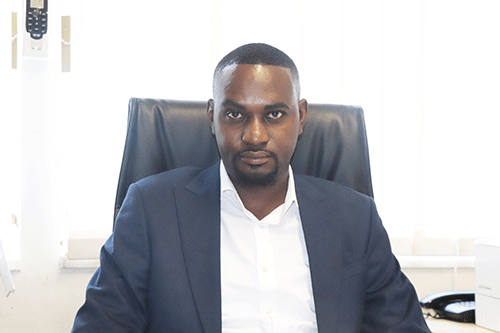Lahja Nashuuta
It takes complete selflessness and commitment to the welfare of humanity to abandon the rewards that come with rising the corporate ladder in the private sector for a job in the civil service, even though professional growth is guaranteed.
Even when growth comes in the civil service, it often happens at a snail’s pace.
This is the story of Donald Max Lungameni Lamek, a now-committed civil servant.
Lamek is a senior legal officer in the Ministry of Justice, Directorate Legal Services.
Born at Onandjokwe in northern Namibia, Lamek joined the public service in 2022 after a considerable stint in private practice.
“It was during my time at this esteemed law firm that my legal career truly began to take shape. During my time in private practice, I had the opportunity to work on a wide range of cases, representing clients from various backgrounds. This experience allowed me to develop a deep understanding of different areas of law and sharpened my ability to analyse complex legal issues,” he said.
Visibly, it is a decision he does not regret.
Asked why he joined the civil sector, among other things, Lamek was inspired by the ethics and sense of responsibility that come with working for the State.
“Joining the government was the patriotic thing to do. Being employed alone is something that I am grateful for. Hence, every day I have the opportunity to come to work, which is a blessing on its own,” he said.
He decided to join the public service to continue making a positive contribution to the socio-economic drive of Namibia by offering his knowledge and skills
“I joined the public service so that I could share the vast knowledge I gained over the years for meaningful contributions within the public service.”
The job
Lamek is responsible for issuing apostille, processing requests for extradition and mutual legal assistance in criminal matters, processing requests for reciprocal service of court process on behalf of foreign states, processing requests for reciprocal enforcement of maintenance orders, and foreign civil judgements on behalf of foreign governments.
As the senior legal officer, his work also requires drafting and submitting reports to international human rights’ bodies. He responds to queries and questions on human rights and international humanitarian law, representing the government at SADC, African Union, Commonwealth, and United Nations meetings on legal matters.
His work, however, is not without its share of challenges.
Lamek, however, views challenges as opportunities to learn and grow.
“In every working environment, there will always be challenges. However, under our directorate, we are all team members, and we are always
ready and willing to lend a helping hand. After all, we are public servants at the end of the day,” he said.
As a lawyer, Lamek strongly believes that his expertise has been beneficial in solving complex legal matters.
Humble beginning
He said growing up in Windhoek allowed him to experience life
in a positive way, and exposed him to diverse cultures and perspectives.
“As a child eager to learn more about the world around me, attending Emma Hoogenhout Primary School provided a solid foundation for my education. Upon completing primary school education with satisfactory results that demonstrated a strong academic aptitude and a passion for learning new things each day, Delta Secondary High School became my next destination for continuing education.
Lamek holds a degree of Baccalaureus Juris (B. Juris) from the University of Namibia and an honours degree (LLB) from the University of Western Cape.
He continued: “After completing my degree at the University of Namibia, I decided to broaden my horizons by pursuing further studies. With great enthusiasm, I embarked on a new chapter of my educational journey at the University of Western Cape in South Africa. It was there that I obtained an honours degree (LLB), which expanded upon the knowledge gained from previous studies before I proceeded to the Republic of South Africa.”
Queried on the prevalent perception that civil servants are largely ineffective and not committed to service delivery, Lamek did not mince his words, saying: “This is rather an ignorant and misguided statement. All public servants know their function and duties, which are exercised with high standards and pride, regardless of their positions.”
Future
Despite being passionate and to-the-minute with his work, he could not predict the future.
For him, only time will tell.
However, Lamek envisioned a Namibia where every citizen strives to better themselves in every aspect of their lives and careers.
“I wish to see myself having achieved all the goals I have set out for myself, both individually and professionally, and to be in good health.”
-lnashuuta@gmail.com



